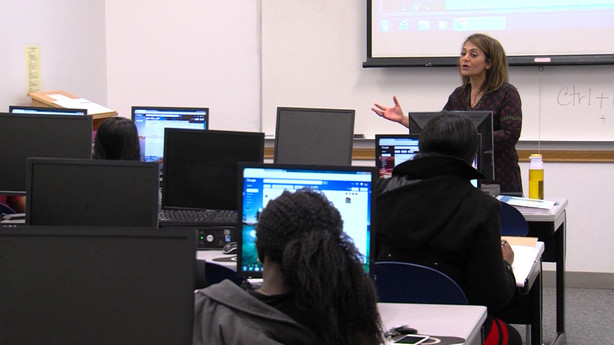Having trouble viewing the video? Try disabling any ad blocking extensions currently running on your browser.
SALT LAKE CITY — Imagine being dropped into life in a foreign country where you have to quickly find a job. You'll need to learn English and get computer skills. A new program at Salt Lake Community College is helping refugees connect to a brighter future.
Moti Maya Tamang works as a housekeeper at the University of Utah Hospital and she loves it. "They are all nice to me and they are friendly," says Moti.
Moti arrived in Utah from Nepal four years ago. But she realizes she still has a lot to learn. "If I learn more it will be better for me, it will be better for my family, I think."
Learning basic computer skills is part of Moti's plan to earn more money. She and her husband, Lakh Man Tamang, hope to move up the employment ladder. He says, "In order to get good job, the computer is needed in our daily life. And that is why we are here."
Tahmina Martelly teaches the first of three computer skills classes being offered at Salt Lake Community College. "You're helping someone to move up, have viable jobs and give back to society. And they actually progress and make living wages and do really, really well," says Martelly.
Martelly is a refugee from Bangladesh. "Computer skills are taken for granted," she says. So, Martelly developed the curriculum for this SLCC class with the needs of refugees in mind.
"I'm a little behind on my computer skills so I want to start from the basics to go up," says Bhakti Subedi, a refugee from Bhutan.
Moti agrees, saying, "We get a chance to learn more things about this because about typing we have no idea, about computer, we have no idea before."
They have no idea how to send basic emails and attachments … simple skills needed to get or keep a job.
"We are living in a technology world right now and we must learn those techniques for us to be able to work in an environment, to work with people," says Aguot Luka, a refugee from South Sudan.
The refugees also need to speak with employers and co-workers. Reading and listening to English on the Internet often help refugees to more easily learn the language.
"Before, I did not know how to speak properly, also when I come from Nepal to here," says Moti.
Martelly says, "So, just having basic computer skills puts you on par so that you can at least compete and not only that, but thrive."
Luka is also encouraged. "If you want to go to the workforce, you can just find information online or if you want to apply for a job, you can just do it online."
"Right now, I am so happy because I get a chance to learn and everybody helps me," says Moti.

The eight-week course includes 16 nights of challenging instruction and practice. Before the last class, students celebrate their success with an international potluck dinner.
"To celebrate not only how far they have come but the journey forward," says Martelly.
Moti hopes her journey forward at the hospital will include more responsibilities, better pay and possibly a promotion. "I'm learning here, it's good for me."
It could be good for Moti, her employers and the patients she serves. "They love me, and that is why I like to work here," says Moti.
The basic technology program is funded through a Department of Workforce Services grant. It actually takes three computer skills classes or about six months to complete the program and receive a free laptop computer.
Photos
0
CommentsShowing of 0 comments
References
- ^ login here (www.ksl.com)









